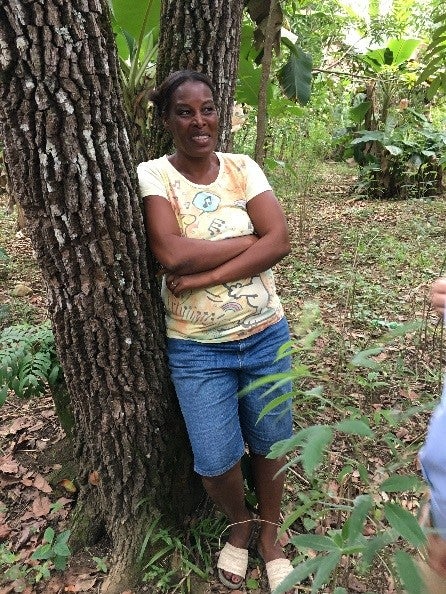
Emilienne Isenady poses while showing off the crops on her land in Lascahobas, Central Plateau, Haiti.
“If I knew that avocados had value, I would plant more of them,” says Emilienne Isenady, a single mother of six in Lascahobas, in the Central Plateau of Haiti.
Emilienne grows and sells avocados to Dominican buyers and to “Madan Saras” (the local name for women brokers who buy and re-sell products in other cities), who will buy the avocados and transport them using the perilous local “tap taps” – trucks converted into public transportation. She will also sell them in the local market in Lascahobas.
Emilienne is a smallholder farmer, but little does she know that she is already part of an avocado local value chain, nor that there is a better avocado Global Value Chain (GVC) out there facing a global shortage.
Emilienne’s is guiding us to see her avocado trees. As we push aside branches, we do not see neatly planted rows of avocado trees but rather a wild two hectares of scattered mango trees, avocado trees, malanga, sweet peas and pineapples. We are accompanied by Marc André Volcy, Farah Edmond and Jean-Berlin Bernard, three “mobile agents” of the Business Support Service team for the Central Plateau Department.
The team is part of a program that the Haitian Ministry of Commerce and Industry has put in place to support entrepreneurs in micro, small and medium-sized enterprises across the country. The program is supported by the World Bank Group’s Business Development and Investment Project (BDI). There are nine other teams just like them in the nine other departments of the country, all working simultaneously on different value-chain reinforcement initiatives (in such sectors as coffee, cocoa, mango, vetiver, honey and apparel).
Marc, Farah and Jean-Berlin live in the Central Plateau, enabling them to support the avocado producers directly, visiting them often and understanding the local political economy. The team has visited about 80 other smallholder farmers like Emilienne in their department, and has invited them to two public meetings and strategic working groups to present key challenges and opportunities for their avocado cluster. The Central Plateau team has carried out the competitive reinforcement initiative of the avocado cluster in their department with training and coaching financed by a grant from the Competitive Industries and Innovation Program (CIIP), through which they have received in-class training and coaching on how to carry out their field projects.
Cecile with the Ministry of Commerce and Industry’s Central Plateau Team, in Lascahobas, Haiti. From left to right: the MCI Central Plateau driver, Marc-André Volcy, Cecile Fruman, Farah Edmond, and Jean-Berlin Bernard.
As we visit the farmers, Marc, Farah and Jean-Berlin explain where and how value is created in the global avocado value chain – and also, even more important, what share of that value could go to the farmers in their avocado cluster, if they had access to certain services. Part of this knowledge comes from the Reference trip the mobile agents went on to the Netherlands, where they met with the best tropical-fruits logistics operators and learned what is involved in the “Ready2Eat” fruit value chain. For instance, in order for Emilienne to share more of the value of her avocados, she needs to get them into a cold chamber within three hours of picking them; keep them at 4 degrees Celsius until they reach the destination un-ripened; ripen them in a ripening chamber at the destination; and then have them delivered to local supermarkets. The premium on avocados in the Ready2Eat, refrigerated value chain is almost 40 percent over the regular avocados. But today, there is no cold chain that Emilienne can use, nor are there any firms that are currently providing these services.
So why is understanding value chains so important for achieving the twin goals of the World Bank Group in Haiti? A parallel study on Industry-Specific GVCs, also funded by CIIP, points out that assuming a linear path to development may not hold true anymore if the only activities performed in the country are low-value-added (like the ones performed in Haiti). There may be still a lot of potential to create and capture value in agricultural value chains, however, if they can enter and compete in the GVCs.
Today, Emilienne sells one kilogram of avocados for approximately US$0.10. By integrating into the Ready2Eat value chain, using a cold chain to control the temperature of the avocado until it reaches the destination, Emilienne could potentially earn US$1.25 per kilogram (adding US$0.96 of value after paying for the cold chain's cost) – effectively receiving more than 12 times what she is currently receiving for each kilogram of avocados.
Helping Emilienne increase the value-added of her products is an example of a sustainable way to improve livelihoods and achieve shared prosperity for the bottom 40 percent of Haitians. What comes next is leveraging the World Bank Group's financing to the Ministry of Commerce and Industry to provide common services, such as cold-chain logistics, to the producers who most need it, like Emilienne.




Join the Conversation